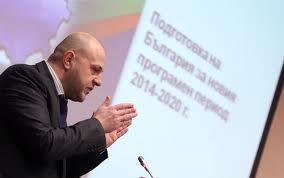30.01.2012The Cohesion Policy and Bulgaria in the Next Programming Period

National Conference on ’The new Programming Period for EU Cohesion Policy 2014 - 2020: Key Changes and Challenges’ brought together representatives of the European Commission, ministers, administrators and NGO activists. The conference was held in Sofia on January 27 and was hosted by Minister for management of EU Funds Tomislav Donchev. CIEDT ‘Amalipe’ was represented by Deyan Kolev.
The participants discussed proposals for new regulations of the European Regional Development Fund and European Social Fund, announced by the European Commission on 6th October, and the Bulgarian stand regarding them. The Bulgarian position will be introduced to the European Council which together with the European Parliament is to decide on approval or rejection of the proposed regulations. The forthcoming activities and timetable for the preparation of new operational programs have also been presented.
‘The Cohesion policy for the next programming period will undergo a number of changes. First of all, it will be transformed into a search tool and means to ensure better fiscal discipline. Second, it will be an instrument to generate and encourage reforms in several key areas. Third, following its main objective to reduce the differences between different regions, it will become a tool for targeted investment in Europe with view to turn it into a faster progressing, wealthier and more competitive continent’, said Minister Donchev.
On behalf of the European Commission's spoke Renaldo Mandmets, head of ‘Bulgaria’ Department in DG ‘Regional Development’. In his words, the primary challenges for Bulgaria include focus on theme targets and sectors called for in Europe 2020 strategy. As an example, he pointed out increasing energy efficiency, development of innovation in the context of cooperation between universities, research institutes and industry and the creation of effective and targeted procurement procedures and documentation.
During the discussion, Deyan Kolev expressed satisfaction from the fact that the proposed new Regulation of the European Social Fund provides for 20% of the funds to be allocated to social inclusion, among the thematic areas of intervention ‘integration of marginalized communities, such as Roma’ being envisaged and that the status of NGOs was made equal to that of the social partners. Furthermore, the availability of the National Roma Strategy is defined as a prerequisite (ex-anteconditionality) to each member state to be authorized to apply for the European funds. I call for the support of the Bulgarian government in relation to these items in the new Regulation said Kolev and proposed Bulgaria to initiate the transformation of the intervention area ‘Integration of marginalized communities such as Roma’ into priority area. He argues that the need for integrated interventions, including employment, education, social services and health are decisive to be able to achieve real progress on the integration.
Minister Donchev said that the Bulgarian government will stand behind these items to the European Council and the integration of the Roma is one of the priorities for cohesion policy in Bulgaria.
Dobrinka Krasteva, director of ‘Programming of EU Funds’ Directorate introduced the national proposals made on the new Regulations adding that they are yet to be discussed and are thus open to alterations. At this stage, the Bulgarian proposals include:
· Introduction of the overall strategic framework that unites five funds - Cohesion Fund, European Social Fund, European Regional Development Fund, European Fund for Rural Development and the European Fund for Fisheries and Aquaculture. This implies greater synchronization and greater simplification of application procedures and enhanced cross-sectoral integration.
· Introduction of preliminary requirements to monitor the appropriate use of funds. This will be the tool for monitoring the compliance of national policies with European ones. These are the preliminary conditions which each member state shall meet prior to signature of the Partnership Agreement and the approval of Operative Programs. The preliminary requirements are directly linked to the thematic objectives and the horizontal principles.
· Applying the territorial principle in the Partnership Agreement through coordination of the five European Funds and other sources of funding, support for an integrated approach to regional and local development and identification of geographic regions (urban, rural, coastal and mountain regions).
· Enhanced European territorial cooperation, the widest range of tools (macro-regional strategies sea basins and European groups for territorial cooperation).
Ivan Ivanov presented the steps for preparing the documents for the new programming period. They will follow Decree 5 adopted by the Council of Ministers on 11.01.2012 In February, an Interagency Working Group will be established to assist the preparation of the Partnership Agreement between Bulgaria and the EU. In May 2012 the Council of Ministers will approve a list of new operational programs, with their thematically specified objectives, as well as preliminary financial resource required. In June, thematic working groups will be established for preparation of new operational programs. An Act to for Management of EU Funds is foreseen to be adopted in June . In all working groups, representatives of NGOs will be included selected via transparent procedure, promised Ivanov in response to numerous inquiries.
Presentations of the conference can be found at:
http://www.eufunds.bg/bg/pubs/1613








